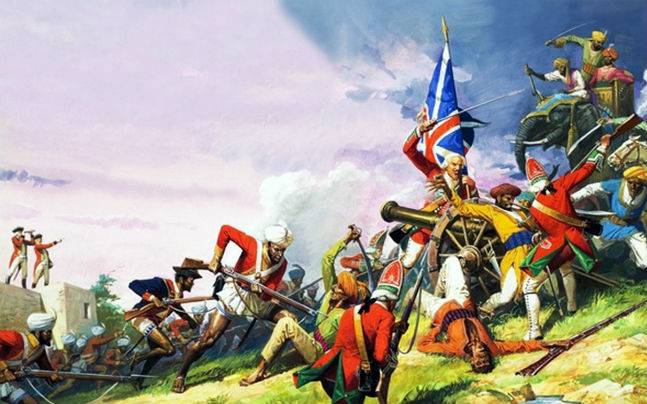
June 23, 2019, marks the 262nd anniversary of the Battle of Plassey (1757). It was a short battle on a long solstice day. A small group of 3000 soldiers defeated a large army of 50,000, using bribes.With that, the private sector East India Company took over the government of Bengal, making the day a turning point in what would, within a century, become the colonisation of India by the British. Palashi (in Bengali) is on the south-north route, from Kolkata to Bengal’s then capital Murshidabad. The Company’s troops were commanded by Robert Clive, whom historian William Dalrymple characterises as an unstable sociopath. Notwithstanding Clive’s violent life, and finally death by suicide at age 49 amidst corruption charges, a statue of ‘Clive of India’ stands prominently outside the Foreign and Commonwealth Office in London.
Clive’s guerrilla methods using conventional armies included slaughter, extortion and looting, says another historian Patrick French. Dalrymple points out how the word ‘loot’ was one of the early Indian entrants into the English language. ‘Loot’ seems a short epithet for the long period of exploitation by the East India Company, unsoftened by Christianity whose missionaries the Company kept out of India until the Charter Act of 1813 that gave sovereignty back to government, albeit the British Crown’s.
Two centurial Independence milestones later, 1857 and 1947, one wonders if the same combination of private sector take-over of government(with impeccable documentation, of course, as in 1757) and a cultural colonisation from northern latitudes will again befall the people of India, never very good at reading royal court politics. In 2019, an army of 200 million BJP voters defeated 350 million citizens who voted against it, if the Election Commission of India is to be believed. The victory is about as good in the public mind as that of Clive 262 years ago, accompanied as it was by Clive-style slaughter, extortion and looting,. While individual candidates are limited to election spends of Rs. 70 lakhs, there was nothing to stop the BJP from spending some of its Rs. 27,000 crores (collected through an electoral bond vehicle that was opaque by design)in what was arguably the largest bribe-distribution exercise in the history of the world. If Siraj-ud-Daulah’s army leaders Mir Jafar, the Jagat Sheths and others only pretended to be on their Nawab’s side but failed to join battle, not much has changed, given the way in which grassroots workers of several non-BJP parties were either not active or switched sides.
The Battle of Plassey was part of a Seven Years’ (World) War (1756-1763) between aspiring European rivals. France was Britain’s main rival in India.Today private sector entities larger than the East India Company are in a‘war’, for nation-sized economies whose governments they try to capture, directly or indirectly, as a welfare-free shortcut to world dominion. As in the 18th century, will India become the first and the brightest crown jewel of a process of cultural and economic colonisation of suffering nations by companies?
Som Thomas is a political commentator










































